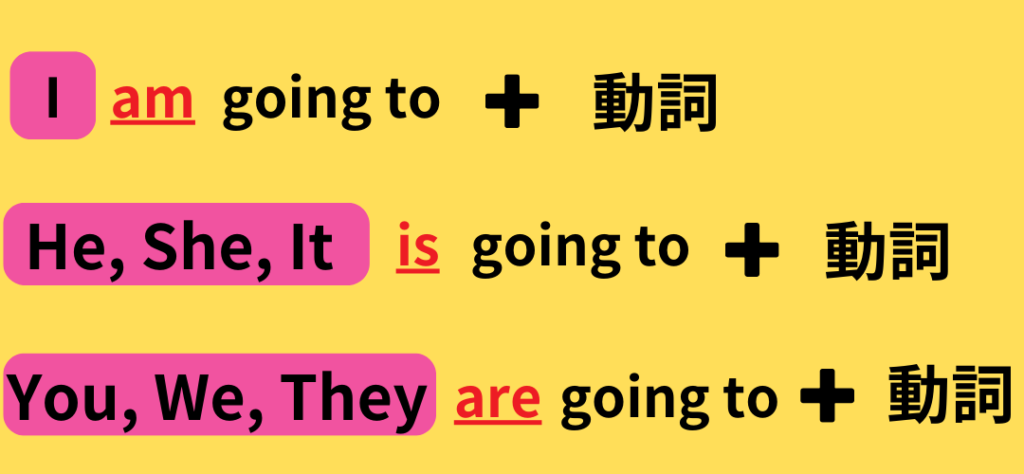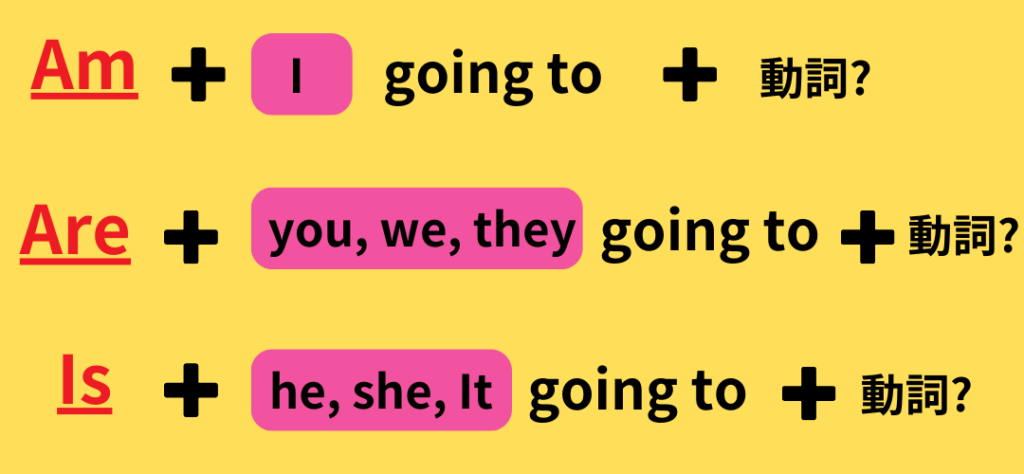英語の文法において、「be going to」は未来の出来事や計画を表すときに使います。この表現は、これから起こることや自分が予定している行動について話すときにとても便利です。この記事では、初心者でもわかりやすいように、be going toの使い方を簡単に説明します。
目次
「be going to」って何?
「be going to」は、未来の予定や計画について話すときに使う表現です。「~するつもりです」や「~する予定です」といった意味を持ちます。
例:
- I am going to study English.
(私は英語を勉強する予定です。) - She is going to meet her friend tomorrow.
(彼女は明日、友達と会う予定です。)
「be going to」の基本の作り方
「be going to」の文は、以下の3つの部分で構成されます:
- 主語(I, you, he, she など)
- be動詞(am, is, are)
- going to + 動詞の原形

例:
- I am going to visit my parents.(私は両親を訪ねるつもりです。)
- He is going to play soccer tomorrow.(彼は明日サッカーをする予定です。)
- We are going to watch a movie tonight.(私たちは今夜映画を見る予定です。)
ポイント:
- am は「I」と一緒に使います。
- is は「he, she, it」と一緒に使います。
- are は「you, we, they」と一緒に使います。
「be going to」の使い方
be going toは、2つの主要な状況で使われます:
1. 未来の計画や予定を話すとき
すでに決まっている計画や、これからすることについて話すときに使います。
- I am going to visit Kyoto next week.
(私は来週、京都に行く予定です。) - They are going to start a new project soon.
(彼らはもうすぐ新しいプロジェクトを始める予定です。)
2. 何かが起こると確信しているとき
近い未来に何かが起こりそうだと確信しているときにも使います。
- Look at the clouds! It is going to rain.
(雲を見て!雨が降りそうだ。) - He is going to fall if he keeps standing on that chair.
(あの椅子に立っていたら、彼は落ちるでしょう。)
否定文の作り方
否定文を作るときは、be動詞の後に「not」を加えます。

例:
- I am not going to watch TV tonight.
(私は今夜テレビを見ないつもりです。) - She is not going to come to the party.
(彼女はパーティーに来ない予定です。)
疑問文の作り方
Yes/no疑問文を作るときは、be動詞を文の最初に置きます。

例:
- Are you going to travel this summer?
(あなたは今年の夏に旅行する予定ですか?) - Is he going to buy a new car?
(彼は新しい車を買うつもりですか?)
Wh疑問文は、何(what)やどこ(where)、いつ(when)などの具体的な情報を尋ねる質問をするときに使います。「be going to」を使った疑問文にも、Wh疑問詞を加えることで、未来の予定や行動に関する情報を聞くことができます。
Wh疑問文の作り方:
- Wh疑問詞(What, Where, When, Why, Who, How など)を文の最初に置きます。
- Be動詞(am, is, are)を主語の前に置きます。
- going to + 動詞の原形を続けます。
例文:
- What are you going to do tomorrow?
(あなたは明日何をする予定ですか?) - Where is she going to go this weekend?
(彼女は今週末どこに行く予定ですか?)
まとめ
「be going to」は、未来の予定や近い未来に起こることを表す、とても使いやすい表現です。基本の形を覚えれば、未来のことを自然に話せるようになります。まずは簡単な例文から始めて、何度も練習してみてください!
練習問題
空欄に適切な言葉を入れましょう。
練習問題は声に出して読み上げましょう。全質問を流暢に言えるまで反復練習を繰り返しましょう。
- I ______ going to study English.
(私は英語を勉強する予定です。) - ______ you going to travel this summer?
(あなたは今年の夏に旅行する予定ですか?) - She is _______ going to come to the party.
(彼女はパーティーに来ない予定です。) - He is going to ________ if he keeps standing on that chair.
(あの椅子に立っていたら、彼は落ちるでしょう。) - I am going to ________ Kyoto next week.
(私は来週、京都に行く予定です。) - _______ are you going to visit your parents?
(あなたはいつ両親を訪ねる予定ですか?) - We are going to ________ a movie tonight.
(私たちは今夜映画を見る予定です。) - _______ they going to start a new project soon?
(彼らはもうすぐ新しいプロジェクトを始める予定ですか?) - Look at the sky! It is going to ________.
(空を見て!雨が降りそうだ。) - He is not going to ________ TV tonight.
(彼は今夜テレビを見る予定はありません。) - ________ she going to play soccer tomorrow?
(彼女は明日サッカーをする予定ですか?) - They are going to ________ a new house next year.
(彼らは来年新しい家を買う予定です。) - _______ is he going to meet his friend?
(彼はどこで友達に会う予定ですか?) - I am not going to _______ the party tomorrow.
(私は明日パーティーに行く予定はありません。) - What _______ she going to do after school?
(彼女は放課後何をする予定ですか?) - _______ are you going to stay during your trip?
(旅行中、どこに滞在する予定ですか?) - She is going to ________ her homework later.
(彼女は後で宿題をする予定です。) - _______ they going to finish the project on time?
(彼らは時間通りにプロジェクトを終える予定ですか?) - We are not going to ________ this problem easily.
(私たちはこの問題を簡単に解決する予定はありません。) - You are _____ going to attend the meeting, are you?
(あなたは会議に参加しない予定ですよね?)
解答
- I am going to study English.
(私は英語を勉強する予定です。) - Are you going to travel this summer?
(あなたは今年の夏に旅行する予定ですか?) - She is not going to come to the party.
(彼女はパーティーに来ない予定です。) - He is going to fall if he keeps standing on that chair.
(あの椅子に立っていたら、彼は落ちるでしょう。) - I am going to visit Kyoto next week.
(私は来週、京都に行く予定です。) - When are you going to visit your parents?
(あなたはいつ両親を訪ねる予定ですか?) - We are going to watch a movie tonight.
(私たちは今夜映画を見る予定です。) - Are they going to start a new project soon?
(彼らはもうすぐ新しいプロジェクトを始める予定ですか?) - Look at the sky! It is going to rain.
(空を見て!雨が降りそうだ。) - He is not going to watch TV tonight.
(彼は今夜テレビを見る予定はありません。) - Is she going to play soccer tomorrow?
(彼女は明日サッカーをする予定ですか?) - They are going to buy a new house next year.
(彼らは来年新しい家を買う予定です。) - Where is he going to meet his friend?
(彼はどこで友達に会う予定ですか?) - I am not going to attend the party tomorrow.
(私は明日パーティーに行く予定はありません。) - What is she going to do after school?
(彼女は放課後何をする予定ですか?) - Where are you going to stay during your trip?
(旅行中、どこに滞在する予定ですか?) - She is going to do her homework later.
(彼女は後で宿題をする予定です。) - Are they going to finish the project on time?
(彼らは時間通りにプロジェクトを終える予定ですか?) - We are not going to solve this problem easily.
(私たちはこの問題を簡単に解決する予定はありません。) - You are not going to attend the meeting, are you?
(あなたは会議に参加しない予定ですよね?)

